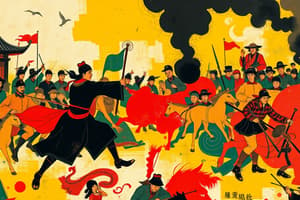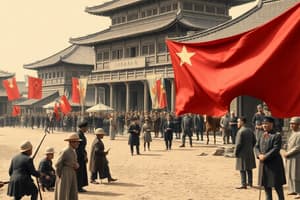Podcast
Questions and Answers
What was the significance of the opium trade in China in the nineteenth century?
What was the significance of the opium trade in China in the nineteenth century?
It reversed the trade imbalance in favor of Britain.
Which of the following was a consequence of the Taiping Uprising?
Which of the following was a consequence of the Taiping Uprising?
- Increased trade with Europe
- A rise in foreign influence
- The provincial gentry consolidating their power at the expense of the central state (correct)
- Improvement in the Qing dynasty's power
Which of the following reflects the goal of the policies introduced by the Chinese state in the 1860s and 1870s?
Which of the following reflects the goal of the policies introduced by the Chinese state in the 1860s and 1870s?
- To maintain traditional practices
- To resist foreign influence
- To reinvigorate China by selectively borrowing from the West (correct)
- To expand territorial boundaries
Critics of industrialization who argue that the Industrial Revolution was a failure generally base their interpretation on which criterion?
Critics of industrialization who argue that the Industrial Revolution was a failure generally base their interpretation on which criterion?
Which of the following contributed to China's problems in the nineteenth century?
Which of the following contributed to China's problems in the nineteenth century?
Why did Islam retain a hold on its civilization in the twentieth century more firmly than Confucianism did in China?
Why did Islam retain a hold on its civilization in the twentieth century more firmly than Confucianism did in China?
Which of the following was an anti-foreign movement that erupted in northern China at the turn of the twentieth century?
Which of the following was an anti-foreign movement that erupted in northern China at the turn of the twentieth century?
What was a result of the reform program launched by the Japanese leadership in the late nineteenth century?
What was a result of the reform program launched by the Japanese leadership in the late nineteenth century?
What did the Young Turks advocate?
What did the Young Turks advocate?
Which of the following was a target for attack in the new nationalism that emerged in China at the turn of the twentieth century?
Which of the following was a target for attack in the new nationalism that emerged in China at the turn of the twentieth century?
What could countries with a sphere of influence in China do within their respective spheres?
What could countries with a sphere of influence in China do within their respective spheres?
Match the following agreements between European countries and the Ottoman Empire:
Match the following agreements between European countries and the Ottoman Empire:
Which of the following contributed to the contraction of the Ottoman Empire in the nineteenth century?
Which of the following contributed to the contraction of the Ottoman Empire in the nineteenth century?
In what respect were Qing China and the Ottoman Empire similar in the nineteenth century?
In what respect were Qing China and the Ottoman Empire similar in the nineteenth century?
How did Napoleon's invasion of Egypt in 1798 affect the Ottoman Empire?
How did Napoleon's invasion of Egypt in 1798 affect the Ottoman Empire?
Which of the following was a goal of the Young Ottomans?
Which of the following was a goal of the Young Ottomans?
In the nineteenth century, which group in the Ottoman Empire advocated a program of radical secularization and modernization along European lines?
In the nineteenth century, which group in the Ottoman Empire advocated a program of radical secularization and modernization along European lines?
Which was the only country outside of Europe and North America to successfully launch its own Industrial Revolution?
Which was the only country outside of Europe and North America to successfully launch its own Industrial Revolution?
What do the many rules and regulations issued by the Tokugawa shogunate reflect?
What do the many rules and regulations issued by the Tokugawa shogunate reflect?
Which of the following reflects the combination of foreign and Japanese elements characteristic of Meiji reforms in the late nineteenth century?
Which of the following reflects the combination of foreign and Japanese elements characteristic of Meiji reforms in the late nineteenth century?
What did the United States expect to gain by sending a naval fleet to Japan in 1853?
What did the United States expect to gain by sending a naval fleet to Japan in 1853?
How did leadership that emerged after the Meiji restoration in Japan respond to the threat of Western imperialism?
How did leadership that emerged after the Meiji restoration in Japan respond to the threat of Western imperialism?
In what way was Japan in a better position than China or the Ottoman Empire in its encounter with Western imperialism?
In what way was Japan in a better position than China or the Ottoman Empire in its encounter with Western imperialism?
Which of the following reflects the combination of foreign and Japanese elements characteristic of Meiji reforms in the late nineteenth century?
Which of the following reflects the combination of foreign and Japanese elements characteristic of Meiji reforms in the late nineteenth century?
Which of the following events established Japan as an economic, political, and military competitor in Asia?
Which of the following events established Japan as an economic, political, and military competitor in Asia?
All of these could be considered 'signs' of a patriarchal society except:
All of these could be considered 'signs' of a patriarchal society except:
According to the reading 'Family Instructions for the Miu Lineage', all would be considered to be the first tenets of a person's good character except:
According to the reading 'Family Instructions for the Miu Lineage', all would be considered to be the first tenets of a person's good character except:
In the reading 'Family Instructions for the Miu Lineage', what is the proper order of respect in the family?
In the reading 'Family Instructions for the Miu Lineage', what is the proper order of respect in the family?
According to the article 'Qing Law Code on Marriage, 1644-1810', all were reasons that a husband could legally divorce his wife except:
According to the article 'Qing Law Code on Marriage, 1644-1810', all were reasons that a husband could legally divorce his wife except:
What was considered to be 'Western European marriage patterns'?
What was considered to be 'Western European marriage patterns'?
Flashcards are hidden until you start studying
Study Notes
Opium Trade and Its Impact
- The opium trade in 19th-century China significantly reversed the trade imbalance, favoring Britain.
Taiping Uprising Consequences
- The Taiping Uprising allowed the provincial gentry to consolidate power, undermining the central authority of the Chinese state.
Chinese Reform Policies (1860s-1870s)
- The Chinese state aimed to reinvigorate the country by selectively adopting Western practices to address internal problems.
Industrial Revolution Critique
- Critics of industrialization often cite environmental preservation as a key criterion for judging the Industrial Revolution a failure.
Chinese Challenges in the 19th Century
- China's struggles in the 19th century were exacerbated by the government's failure to maintain flood control and ensure public security.
Islamic Civilization vs. Confucianism
- In the 20th century, Islamic civilization maintained stronger cultural cohesion than Confucianism, due to its independent centers.
Boxer Uprising
- The Boxer Uprising was a nationalist and anti-foreign movement in northern China that significantly weakened the Qing dynasty.
Japanese Reform Outcomes
- The late 19th-century reform program in Japan led to a dramatic transformation in its social structure.
Young Turks Movement
- The Young Turks advocated for a secular, national Turkish state rooted in modernization and reform.
New Nationalism in China
- At the turn of the 20th century, the new nationalism in China targeted the Qing dynasty as a primary adversary.
Foreign Influence in China
- Countries with spheres of influence in China were permitted to construct railroads within their designated areas.
Ottoman Empire and European Relations
- The capitulations imposed by European powers on the Ottoman Empire were akin to the unequal treaties affecting China.
Ottoman Nationalist Movements
- The decline of the Ottoman Empire was fueled by nationalist independence movements in Greece, Serbia, Bulgaria, and Romania.
Qing China and Ottoman Similarities
- Both Qing China and the Ottoman Empire functioned as semi-colonies within Europe's informal empires during the 19th century.
Napoleon and the Ottoman Empire
- Napoleon's invasion of Egypt in 1798 led to the loss of Egypt as a province for the Ottoman Empire.
Young Ottomans' Goals
- The Young Ottomans aimed to establish a European-style democratic and constitutional regime within the Ottoman Empire.
Young Turks and Secularization
- The Young Turks promoted radical secularization and modernization of the Ottoman political system along European lines.
Japan's Industrial Revolution
- Japan was unique in successfully launching its own Industrial Revolution, distinguishing it from other non-European nations.
Tokugawa Shogunate’s Regulations
- The strict regulations of the Tokugawa shogunate sought to maintain societal stability by freezing Japanese society in its current state.
Meiji Reforms
- The urbanization during the Meiji reforms illustrates the blend of foreign influences with traditional Japanese elements.
U.S. Naval Fleet to Japan
- The United States deployed a naval fleet to Japan in 1853 with the goal of opening Japanese ports for trade.
Japanese Response to Western Imperialism
- Post-Meiji Restoration leaders embraced Western models to effectively counter the threat posed by Western imperialism.
Japan's Position against Western Imperialism
- Japan had an advantageous position compared to China and the Ottoman Empire, being less strategically important to Western powers.
Meiji Constitution
- The Meiji constitution represents the hybridization of foreign and Japanese elements characteristic of late 19th-century reforms.
Ruso-Japanese War Consequences
- The victory in the Ruso-Japanese War established Japan as a competitive economic, political, and military power in Asia.
Patriarchal Society Indicators
- Divorce laws reflecting equal rights for men and women do not conform to traditional signs of a patriarchal society.
Family Hierarchy in Miu Lineage
- "Family Instructions for the Miu Lineage" articulated a structured respect hierarchy: parents, brothers, wives, and children.
Divorce Laws in Qing Legal Code
- The Qing Law Code stipulated grounds for divorce; having no living family was not a valid reason for a husband to request a divorce.
Western European Marriage Patterns
- Western European marriage patterns are characterized by the trend of individuals delaying marriage until adulthood.
Studying That Suits You
Use AI to generate personalized quizzes and flashcards to suit your learning preferences.




